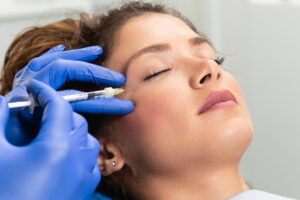 So over my career of over 20 years, I have had a couple patients where BOTOX® Cosmetic just didn’t work. At first I thought, maybe the dose was low? Maybe it wasn’t really Botox? Maybe the patient was confused or it did work but wore off quickly? So then I did a Botox injection on them myself. When I do a Botox injection after doing this thousands of times, I knew the Botox was fresh, true Allergan Botox, and the right number of units. And it just didn’t work.
So over my career of over 20 years, I have had a couple patients where BOTOX® Cosmetic just didn’t work. At first I thought, maybe the dose was low? Maybe it wasn’t really Botox? Maybe the patient was confused or it did work but wore off quickly? So then I did a Botox injection on them myself. When I do a Botox injection after doing this thousands of times, I knew the Botox was fresh, true Allergan Botox, and the right number of units. And it just didn’t work.
Hmmm.
So when I saw this article in our Plastic and Reconstructive Surgery Journal from April 2022 “Botulinum Toxin Type A Immunogenicity across Multiple Indications: An Overview Systematic Review” my interest was piqued. Essentially they did a review of 203 studies and 17,815 patients to answer the question:
Can you become resistant to Botox?
The answer is yes but almost never in cosmetic patients. Antibodies to Botox are rare (1-2% kind of rare) AND it almost always is seen in those getting super high doses for things like dystonia, spasticity of muscles, and urologic conditions. “It is nil to insignificant for aesthetic indications.”
Why is it different? Likely mostly because of the frequency of injections and the amount. The numbers are wildly different. When someone has cerebral palsy and they do Botox injections for muscle spasm, the amount of Botox is 15-25 units per kilogram of body weight. When we do Botox for your frown lines, we are doing 24 units in a woman who weighs 140 pounds (63kg), which equates to 0.38 units per kilogram.
Why does it happen?
Your body forms neutralizing antibodies.
- When you form an antibody, then when you see the thing the antibody is primed for, it neutralizes it.
- There was not a difference between the different BotulinumtoxinA brands (ie Dysport and Allergan Botox had the same rate).
- There seems to be a clear association of DURATION of treatment and AMOUNT dosed.
It was an interesting article. It talked about how neutralizing antibodies were not always related to unresponseiveness to Botox (ie some of those with antibodies the Botox still worked). They did not see any other systemic effects- the fact that they formed antibodies did not lead to a body immune response/reaction, so they are not concerned about safety issues. And there was some question as to if the numbers are improved, as now the Botox is manufactured better / better preparation.
So my thoughts?
I truly have seen people where Botox just didn’t work (And reminder here that this number is 1-2 patients over my 20+ year career). I wonder if I could go back and test them now, if they have antibodies. The studies indicate the aesthetic use of Botox amounts are so low that it is very unlikely, but maybe they have a genetic presdisposition or some other issue.
The information provided on this website is for general informational purposes only and does not constitute medical advice, diagnosis, or treatment. Always seek the advice of a qualified healthcare provider for any questions regarding your health or medical condition.
